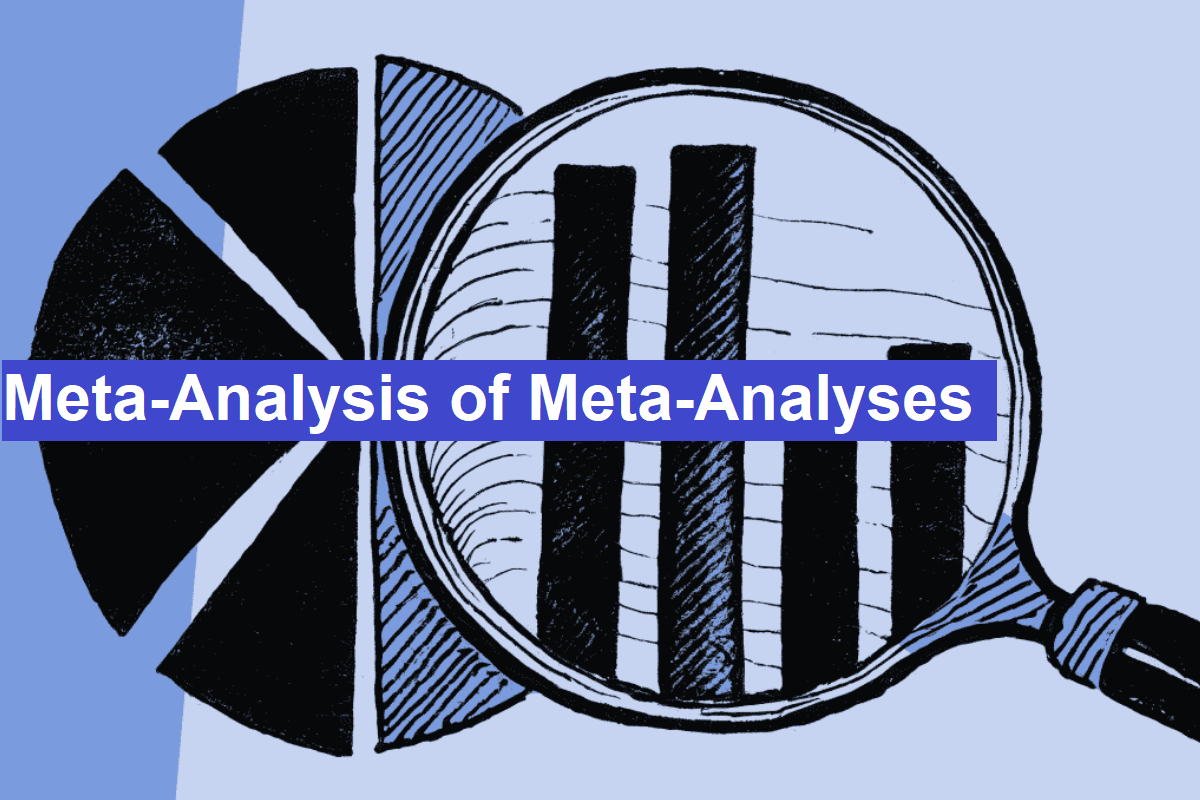A Meta-Analysis of Meta-Analyses, also known as a "meta-meta-analysis" or an "overview of reviews," is a sophisticated analytical method used to aggregate and synthesize findings from multiple meta-analyses on similar topics.
This higher-order meta-analysis provides a comprehensive summary of evidence, allowing researchers to draw broader conclusions across various systematic reviews and meta-analyses.
Detailed Process of Meta-Analysis of Meta-Analyses
-
Literature Identification and Selection:
- Comprehensive Search Strategy:
- Database Selection: Utilize major databases such as PubMed, Cochrane Library, Embase, PsycINFO, and Scopus to ensure a thorough search.
- Search Terms: Develop a detailed search strategy with specific keywords and Boolean operators to identify relevant meta-analyses.
- Search Limits: Apply limits based on publication date, language, and study design as necessary.
- Screening and Selection:
- Inclusion Criteria: Define criteria such as relevance to the research question, methodological quality, and scope of meta-analyses.
- Screening Process: Conduct initial screening based on titles and abstracts, followed by full-text review of selected studies to confirm eligibility.
- Data Management: Use reference management software to track and organize selected meta-analyses.
- Comprehensive Search Strategy:
-
Data Extraction and Management:
- Standardized Data Extraction:
- Extraction Form: Develop a standardized data extraction form to ensure consistency in capturing key variables.
- Key Variables: Extract data such as effect sizes, confidence intervals, study sample sizes, populations, interventions, and outcome measures.
- Data Compilation:
- Data Organization: Compile extracted data into a comprehensive database, categorizing information by meta-analysis and relevant variables.
- Data Validation: Perform quality checks to verify the accuracy and completeness of extracted data.
- Standardized Data Extraction:
-
Statistical Analysis:
- Combining Results:
- Effect Size Calculation: Aggregate effect sizes from individual meta-analyses using appropriate statistical methods (e.g., weighted average, random-effects models).
- Heterogeneity Assessment: Assess heterogeneity among meta-analyses using statistics such as I², Q statistic, and tau².
- Sensitivity Analysis: Conduct sensitivity analyses to test the robustness of results against variations in inclusion criteria or data handling.
- Publication Bias Assessment:
- Funnel Plots: Create funnel plots to visually inspect for asymmetry, indicating potential publication bias.
- Statistical Tests: Apply tests like Egger’s test or Begg’s test to statistically assess publication bias.
- Correction Methods: Use methods such as trim-and-fill or other adjustments to address identified biases.
- Combining Results:
-
Interpretation of Findings:
- Trend Analysis:
- Pattern Identification: Identify and interpret common patterns or discrepancies across the meta-analyses.
- Effect Consistency: Evaluate the consistency of effect sizes and conclusions across different meta-analyses.
- Contextualization:
- Comparative Analysis: Compare findings with other systematic reviews or meta-analyses to contextualize results.
- Implications for Practice: Discuss the implications for clinical practice, policy-making, or future research directions.
- Trend Analysis:
-
Reporting and Documentation:
- Comprehensive Report:
- Structure: Include sections such as introduction, methodology, results, discussion, and conclusions.
- Visual Representations: Present findings using tables, figures, and charts to illustrate key results and trends.
- Detailed Appendices: Provide detailed appendices with supplementary data, full search strategies, and data extraction forms.
- Adherence to Guidelines:
- Reporting Standards: Follow guidelines such as PRISMA (Preferred Reporting Items for Systematic Reviews and Meta-Analyses) for transparent reporting.
- Quality Assurance: Ensure the report meets high standards of clarity, accuracy, and completeness.
- Comprehensive Report:
Services Offered by Meta-Analysiss.com
-
Expert Consultation and Planning:
- Scope Definition: Collaborate with researchers to define the scope and objectives of the meta-analysis of meta-analyses.
- Protocol Development: Assist in developing a detailed protocol outlining methodologies, criteria, and analysis plans.
-
Comprehensive Literature Search:
- Database Searches: Execute thorough searches across relevant databases to identify applicable meta-analyses.
- Screening and Selection: Systematically screen and select meta-analyses based on rigorous inclusion criteria.
-
Data Extraction and Synthesis:
- Data Extraction: Extract relevant data using standardized methods to ensure consistency and accuracy.
- Statistical Analysis: Perform advanced statistical analyses to aggregate findings, assess heterogeneity, and address publication bias.
-
Quality Control and Assurance:
- Methodological Rigor: Apply rigorous methodological standards and quality checks throughout the process.
- Quality Reviews: Conduct reviews and revisions to ensure the analysis adheres to best practices and reporting guidelines.
-
Reporting and Presentation:
- Comprehensive Reporting: Prepare detailed reports summarizing findings, trends, and implications.
- Visual Aids: Create tables, graphs, and charts to effectively communicate results.
By utilizing the expertise of Meta-Analysiss.com, researchers can ensure that their meta-analysis of meta-analyses is executed with precision, providing a high-level synthesis of evidence that enhances the understanding of complex research questions and informs future studies.





